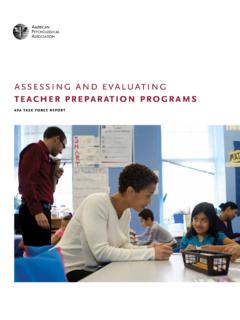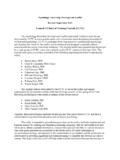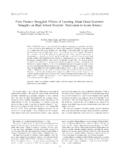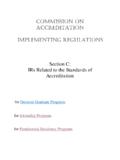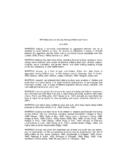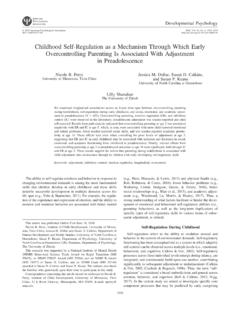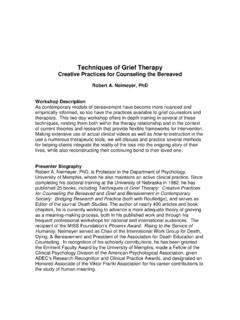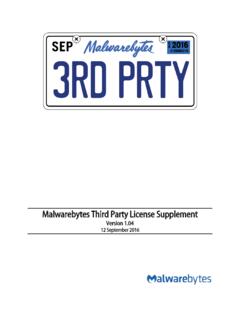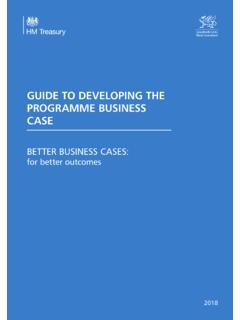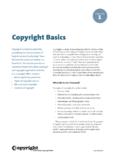Transcription of A Graduate Student’s Guide to Determining Authorship ...
1 A Graduate Student s Guide to Determining Authorship Credit and Authorship Order APA Science Student Council 2006 For more information about the APA Science Student Council, please visit Introduction As a Graduate student, conducting research and publishing your work is essential to your professional development and the advancement of your career. Your involvement in this process provides the opportunity to learn new skills, network with other researchers in your area of interest, and personally contribute new knowledge to the field. As you advance in your studies, you will likely carry increased responsibility throughout the research process, including the development of investigations, collecting and analyzing data, and presenting and publishing your findings. Although it is often viewed as the final stage and endpoint of a given study, publication actually reflects the culmination of efforts and contributions made by everyone involved that has made the dissemination of findings possible.
2 Authorship is often the primary way by which to acknowledge the contributions of individuals involved in a project, and as a Graduate student, it can be a rewarding experience and achievement to see your name on a published manuscript for the first time. Because of the importance placed on publication in psychology and related fields, and the increasing number of multi-authored articles (Gladding, 1984; Iammarino, O Rourke, Pigg, & Weinberg, 1989), negotiating and Determining Authorship is an important part of the research process. An open discussion on Authorship among all individuals involved in a project is necessary throughout the research process. Specific issues involving Authorship may become more salient at different points in a project, and can reflect either new developments or revisited issues from an earlier discussion.
3 As such, we view the negotiation and determination of Authorship as a dynamic process, rather than a predetermined or fixed decision. This process to proceed in the spirit of collaboration and in an egalitarian manner among all individuals involved in the study. The purpose of this website is to introduce and provide information regarding the process of negotiating and Determining Authorship , particularly from a Graduate student perspective. You will also find materials and resources that outline a variety of issues and topics related to Authorship . The included worksheets and agreements (which can be found here) can be used to facilitate a dialogue with your advisor and/or colleagues around Authorship , and can be referred to throughout the research process. In addition, references to pertinent articles and links to examples of university guidelines are provided.
4 What is Authorship and How is it Determined? Authorship entails a public acknowledgment of scientific or professional contribution to a disseminated piece of information (see APA, 2002) and includes involvement in various tasks associated with the project (National Health and Medical Research council, 1997). As such, a number of interrelated factors are considered in Determining Authorship . The APA Ethical Principles of Psychologists and Code of Conduct (2002, Section ) also addresses certain criteria for Authorship by stating: (a) Psychologists take responsibility and credit, including Authorship credit, only for work they have actually performed or to which they have contributed. (b) Principal Authorship and other publication credits accurately reflect the relative scientific or professional contributions of the individuals involved, regardless of their relative status.
5 Mere possession of an institutional position, such as Department Chair, does not justify Authorship credit. Minor contributions to the research or to the writing for publication are appropriately acknowledged, such as in footnotes or in an introductory statement. (c) A student is usually listed as principal author on any multiple-authored article that is based primarily on the student s dissertation or thesis. Faculty advisors discuss publication credit with students as early as feasible and throughout the research and publication process as appropriate. Negotiating Authorship The guidelines and definitions of Authorship provided by various professional organizations offer general conceptualizations and provisions for researchers. As such, they may not offer comprehensive or unambiguous definitions (Fine & Kurdek, 1993), and collaborators must further discuss and reach consensus on certain issues, such as identifying what constitutes a scientific contribution, how Authorship order is decided upon, and how to engage in the process of Authorship determination.
6 Discussion of Authorship and Authorship order will optimally begin at the inception of a research project, and involve a purposeful and thoughtful examination of expected contributions of the individuals who are involved in the project (Winston, 1985). Depending on the scope of a particular project, it is possible that several manuscripts will be planned, each of which could involve different authors or different Authorship orders. In this event, it is especially important to discuss Authorship at the beginning of the project. When discussed, it is helpful for everyone to recognize that initial Authorship and Authorship order can change throughout the development of the project if necessary in order to better reflect the actual contributions of all investigators. Although it is not always the case that significant changes are made in regard to Authorship after the initial determination, several common reasons for change are discussed below.
7 All individuals involved in the project to take part in these discussions in an open and professional manner. Changes should be decided upon mutually after consideration of each individual s perspective and review of each individual s contributions. The Basics Authorship -related planning should include the collaborative discussion of the expected roles and responsibilities of each contributor. As a Graduate student who is significantly involved in a research project, it will be helpful for you to consider several issues as part of this process. For example, consider your short-term and long-term goals, and how your involvement on this specific project will provide the opportunity to work toward these goals. Keep in mind that each project brings unique opportunities and responsibilities, and that you will most likely be involved in multiple projects simultaneously as you advance in your Graduate studies.
8 Authorship can provide the opportunity to begin, enhance, and advance your involvement on future and related projects, strengthen your affiliations with other Graduate students and professors, and advance your overall career. Given your status as a Graduate student, it may at first feel intimidating to discuss the role(s) you would like or expect, and your place as a contributing author. However, this can be viewed as an excellent learning opportunity that will contribute to your professional identity as a researcher and scholar, and that will eventually contribute to your identity as a colleague among other researchers. Most advisors and senior researchers will be happy to talk with you about Authorship , and consider this a part of the student-advisor relationship. Given the number of responsibilities associated with the completion of a research project, there are usually a number of contributors.
9 A checklist like this can offer a helpful outline of the various necessary tasks and who will be responsible for completing each task. As such, this checklist not only helps facilitate the organization and delegation of various responsibilities, it also provides an initial opportunity to begin a collaborative negotiation of Authorship and initial Authorship order among the individuals involved in the project. This checklist can also serve as a basic example for the development of your own checklist that is specific to the given research project. Authorship Negotiation Worksheet (Winston, 1985) An Authorship -determination worksheet such as this provides a quantitative example for Determining Authorship and Authorship order. Detailed information on this worksheet is provided by Winston (1985) and general information is provided below.
10 The use of this worksheet is most effective when completed collaboratively among all individuals involved in the project. The overall purpose of the instrument is to provide an easy and clear way to negotiate and determine Authorship and to clarify the expected roles of each contributor. This involves discussing who will do or has done certain tasks, and then assigning appropriate points to each task. For example, the conceptualization and clarification of the research idea and design is assigned 50 points by default. These points can also be delegated to several contributors to reflect relative contributions to each task ( , contributor A may receive 40 points, and contributor B may receive 10 points). The default weight given to each task might also be negotiated depending on the given project. For example, less weight will likely be attached to the conceptualization section of a basic replication and extension project.

